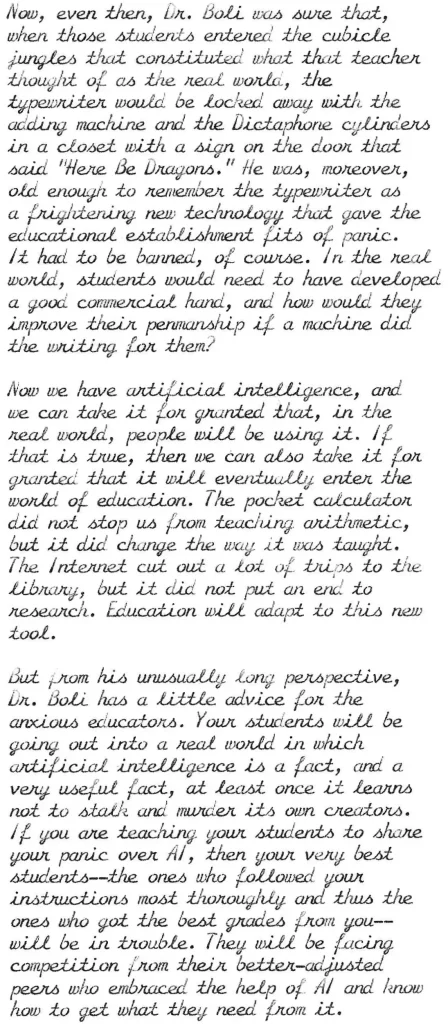



Transcribed below.
Educating the AI Generation.
Since we have been amusing ourselves with artificial intelligence lately, it may amuse us a little more to observe the panic it has caused in the world of education.
Educators are prone to panic. It is an occupational hazard, like chalk lung and tweed, whose risks educators accept when they go into the business. Educators like to tell us that they are teaching students to think for themselves, but what they really mean is that they are trying to make the students think like middle-aged educators. Since the world is still turning, and the things that were important to one generation become irrelevant to the next, educators are constantly making the appalling discovery that, when their students do think for themselves, they are thinking the wrong thoughts.
Now come these artificial intelligences with their ability to compose essays and sonnets and even haiku, and all the high-school English teachers in America see civilization coming to an end, and their jobs with it. The usual desperate flailing has ensued. Students have been warned that, if they do have recourse to the robot brain, they will suffer the severest consequences. Our friend Wikipedia, which is still mostly edited by humans, notes that—to give but one example—the New York City Department of Education has officially banned access to ChatGPT.
We can certainly understand what the educators are thinking. Students may be turning in work that is not their own. Here we are trying to mold their young minds, and they go off and cheat!
Now, Dr. Boli appreciates the old ways of doing things more than most people. He is writing this article on a Hermes 3000, which does not even connect to the power grid, let alone the Internet. And after this month sacred to typewriters, he will be celebrating International Steel Pen Appreciation Month.
But there are certain advantages to a long life and a good memory. When he watches the educational establishment twisting itself in baroque knots over artificial intelligence, Dr. Boli remembers the early 1980s, when computers first began to slip into American homes. They caused a similar panic among the educators, and Dr. Boli remembers one high-school English teacher telling him that she gave an “automatic F” to any essay if she discovered that the student had written it on a computer. Her reason (she explained when Dr. Boli asked) was that, in the real world, students would have to know how to use a typewriter.
Now, even then, Dr. Boli was sure that, when those students entered the cubicle jungles that constituted what that teacher thought of as the real world, the typewriter would be locked away with the adding machine and the Dictaphone cylinders in a closet with a sign on the door that said “Here Be Dragons.” He was, moreover, old enough to remember the typewriter as a frightening new technology that gave the educational establishment fits of panic. It had to be banned, of course. In the real world, students would need to have developed a good commercial hand, and how would they improve their penmanship if a machine did the writing for them?
Now we have artificial intelligence, and we can take it for granted that, in the real world, people will be using it. If that is true, then we can also take it for granted that it will eventually enter the world of education. The pocket calculator did not stop us from teaching arithmetic, but it did change the way it was taught. The Internet cut out a lot of trips to the library, but it did not put an end to research. Education will adapt to this new tool.
But from his unusually long perspective, Dr. Boli has a little advice for the anxious educators. Your students will be going out into a real world in which artificial intelligence is a fact, and a very useful fact, at least once it learns not to stalk and murder its own creators. If you are teaching your students to share your panic over AI, then your very best students—the ones who followed your instructions most thoroughly and thus the ones who got the best grades from you—will be in trouble. They will be facing competition from their better-adjusted peers who embraced the help of Al and know how to get what they need from it.
What your students need, and they need it desperately, is an education in how to make use of this new tool. Not the mechanics of it: they will figure out for themselves how to make it have goofy hallucinations. What they need is the skill to evaluate the information it gives them. In other words, they need you to teach them how to deal with an artificial intelligence the same way they would deal with a natural intelligence—with a politician, an author, or even a teacher.
The robot speaks: “Haiku? Fantastic!
Here’s a haiku that’s hudibrastic.”
